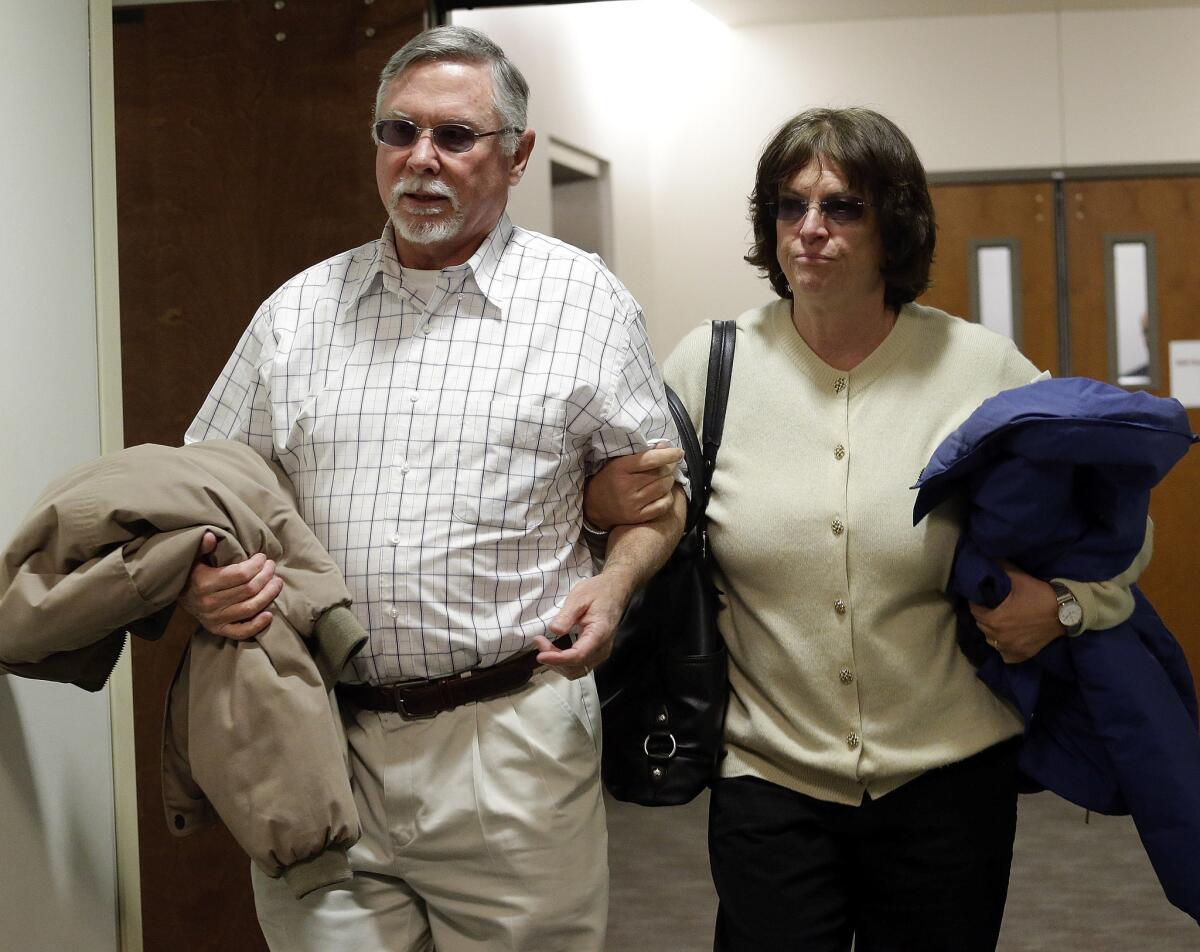James Holmes’ parents plead for their son: ‘He is not a monster’

- Share via
The parents of shooting suspect James Holmes pleaded for their son’s life in a letter sent Friday, arguing that the man accused in the deadly rampage at a suburban Denver movie theater is mentally ill and should be institutionalized for life instead of facing execution.
Holmes, 27, faces the death penalty if he is convicted of killing 12 people and injuring 70 in the 2012 attack on a movie theater in Aurora, Colo. Jury selection is scheduled to start Jan. 20.
The case has reignited arguments over gun control, the death penalty and whether to execute people who are mentally ill. Holmes has been diagnosed with schizophrenia and pleaded not guilty by reason of insanity.
In a letter sent to the Denver Post and emailed to journalists around the country, Robert and Arlene Holmes wrote: “We are always praying for everyone in Aurora. We wish that July 20, 2012, never happened.”
Of their son, they wrote, “We have read postings on the Internet that have likened him to a monster. He is not a monster. He is a human being gripped by a severe mental illness.”
It was Robert and Arlene Holmes’ first comments except for a brief statement immediately after the attack at the theater.
“Treatment in an institution would be best for our son,” they wrote. “We love our son, we have always loved him and we do not want him to be executed.”
Some people who lost loved ones in the attack were unmoved by the letter.
“I think it’s a ploy by the defense and the shooter’s family to save his life,” said Tom Sullivan, whose son Alex was killed on his 27th birthday.
The parents have “had over two years to comment and the timing of this — a week before Christmas — is rather strange,” Sullivan said, adding: “Maybe had they thought about their son’s emotional problems they would have addressed it and maybe my son would be here opening presents this Christmas.”
Marcus Weaver, who was shot in the arm and had a friend killed in the attack, asked why the parents had waited so long.
“People are hurting,” he said in an email to journalists, in which he called the parents’ statement a ploy by defense lawyers to generate “sympathy for a man who has done a horrific thing.”
“For his parents to send us an apology letter three years later is an insult,” Weaver said. “It would have been better if they had said nothing at all.”
The issue of execution and mental illness is a difficult one, said Ron Honberg, director of policy and legal affairs for the National Alliance on Mental Illness, a nonprofit advocacy group.
“The U.S. Supreme Court said in 1980s and clarified in 2007 that it is unconstitutional to execute people who are insane,” he said. “The question is ‘What is insane?’ ’’
The Supreme Court left it up to the local courts to decide how to administer the law and it has varied depending on the jurisdiction, Honberg said. In general, courts consider mental capacity, as measured by IQ and other tests, as well as rational capacity.
“Was there a delusion so powerful that a person cannot see clearly?” Honberg asked. “The circumstances that surround this case suggest that this was a man who was very, very ill.” A number of people with schizophrenia have been executed over the years, Honberg said, though the exact number is unclear.
The prosecution will probably have a difficult time getting a death penalty conviction, said Denver attorney David Lane, who has been following the Holmes case and has worked as a defense attorney on several capital cases during his more than 35-year career.
In Colorado, “we have had only one execution since 1967 and we have only three people on death row,” he said. “The prosecutor faces extremely long odds in general.”
Colorado, like many states, requires the jury to be unanimous in sentencing a defendant to death, a high bar, especially in sanity cases.
“This was a heinous act, a nightmarish act, fueled by mental illness,” Lane said. “My guess is that, surely, at least one juror will say [Holmes’] illness is so extreme” that it raises questions about a death sentence.
Holmes grew up in California, and in June 2011 enrolled as a doctoral student in neuroscience at the University of Colorado Anschutz Medical Campus in Aurora. In 2012, his academic performance declined, and he scored poorly on the comprehensive exam in the spring. Three days after failing a key oral exam at the university in early June 2012, Holmes dropped out of his studies.
In May 2012, Holmes purchased a Glock 22, then bought the shotgun days later. After failing his oral exam, he bought a Smith & Wesson M&P15 semiautomatic rifle and a second Glock in July. He also purchased 3,000 rounds of ammunition for the pistols, 3,000 rounds for the M&P15, and 350 shells for the shotgun over the Internet, police have said.
Holmes is accused of buying a ticket to the midnight showing of the Batman movie “The Dark Knight Rises,” then leaving and returning to the theater, dressed in tactical gear. He opened fire with a 12-gauge shotgun, a semiautomatic rifle with a drum magazine of ammunition and a Glock handgun.
michael.muskal@latimes.com
More to Read
Sign up for Essential California
The most important California stories and recommendations in your inbox every morning.
You may occasionally receive promotional content from the Los Angeles Times.














